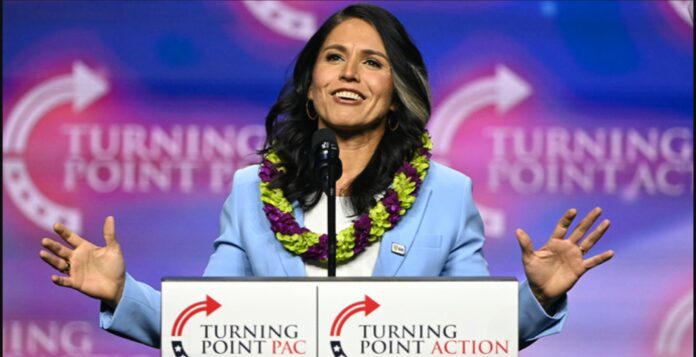In a significant move signaling his intentions to recalibrate U.S. intelligence strategy, Donald Trump has selected Tulsi Gabbard as the next Director of National Intelligence (DNI) for his forthcoming term. Gabbard’s appointment is a bold and unconventional choice, reflecting Trump’s desire to reshape the intelligence community while incorporating diverse political views and experience. The announcement has drawn national attention and a mix of reactions across political, defense, and intelligence circles, with Gabbard bringing both experience and controversy to the role.
A Pioneering Appointment
Tulsi Gabbard, a former U.S. Congresswoman from Hawaii and an Iraq War veteran, is no stranger to public service. She rose to prominence as the first Hindu and first Samoan-American member of the U.S. House of Representatives, representing Hawaii’s 2nd congressional district from 2013 to 2021. A staunch advocate for veterans’ rights, foreign policy reform, and non-interventionist military strategies, Gabbard brings a unique blend of military and political expertise to her new role as the nation’s top intelligence chief.
Her appointment marks several firsts: Gabbard will be the first female Director of National Intelligence, a groundbreaking milestone for the Office of the Director of National Intelligence (ODNI), established post-9/11 to coordinate and oversee the sprawling U.S. intelligence apparatus. Trump’s decision to elevate a figure known for her unconventional and often bipartisan stances reflects his intent to bridge divides and potentially foster a more cohesive approach to national security.
Why Gabbard? Trump’s Rationale
President Trump lauded Gabbard as a “fearless patriot” with a deep commitment to safeguarding America’s freedoms and security. In his statement, he highlighted her decades-long service to the country, emphasizing her military experience and her ability to challenge prevailing norms. Gabbard’s independent streak and history of speaking out against both Democratic and Republican establishment figures align well with Trump’s populist approach. Her selection could symbolize a break from past intelligence leadership accused by Trump of politicization and partisanship.
Tulsi Gabbard’s evolution from a Democratic Party member to an Independent and later a Republican illustrates her shifting political convictions, driven largely by policy differences on foreign intervention, civil liberties, and governance. In recent years, she emerged as a vocal supporter of Trump’s policies on national sovereignty and defense, making her an increasingly prominent figure in Republican circles.
Gabbard’s Military and Legislative Experience
Gabbard’s military background is a key aspect of her qualification for the DNI post. A major in the Hawaii Army National Guard, she deployed twice to the Middle East, where she earned commendations such as the Meritorious Service Medal. Her time in combat zones has shaped her views on national security, foreign policy, and the human cost of war. This firsthand experience informs her stance on the need for measured, strategic military action, contrasting with what she perceives as reckless interventions in past U.S. administrations.
During her tenure in Congress, Gabbard served on influential committees, including Armed Services, Homeland Security, and Foreign Affairs. She consistently advocated for diplomacy, anti-interventionism, and veterans’ issues. Her experience will be critical as she steps into a leadership role over an intelligence community tasked with addressing both traditional threats like terrorism and evolving challenges such as cybersecurity and emerging technologies.
Navigating Complex Intelligence Challenges
Gabbard will lead the U.S. intelligence community at a pivotal time marked by complex challenges, ranging from global geopolitical instability and cyber threats to issues of domestic extremism. Her appointment is expected to bring a fresh perspective to intelligence reform and national security priorities. However, she will likely face scrutiny, particularly from those concerned about her past criticisms of U.S. military interventions in Syria and other contentious areas of U.S. foreign policy.
Detractors have pointed to Gabbard’s meetings with foreign leaders, such as Syrian President Bashar al-Assad, as potentially problematic for her new role. She has defended her diplomatic outreach as necessary for conflict resolution and peacebuilding, even amid controversy. As DNI, she will need to navigate this delicate balance of diplomacy, intelligence gathering, and policy advocacy, while maintaining the trust of both the intelligence community and the American public.
Bipartisanship or Political Risk?
While Trump’s decision has been met with approval by some Republicans and independents who value Gabbard’s outspokenness and willingness to challenge orthodoxy, it has also raised eyebrows. Critics fear her appointment may politicize the intelligence community, pointing to her close alignment with Trump’s populist and nationalist agenda. However, Gabbard’s advocates argue that her nontraditional approach and cross-party appeal could help bridge divides and bring fresh thinking to the intelligence sphere.
Gabbard’s bipartisan appeal is rooted in her efforts to find common ground on contentious issues such as surveillance reform, military engagements, and veterans’ healthcare. As she takes charge of the ODNI, she is expected to draw upon her diverse political and military experiences to address systemic challenges facing U.S. intelligence operations and ensure American security interests remain paramount.
The Road Ahead
Tulsi Gabbard’s confirmation as DNI will undoubtedly spark debate and draw considerable scrutiny. Her ability to lead the intelligence community with impartiality and effectiveness will be tested against a backdrop of complex threats, intense political divisions, and calls for greater transparency and accountability within U.S. intelligence operations. Gabbard’s tenure offers an opportunity to reimagine the role of DNI, potentially making it less partisan and more focused on evidence-based threat assessment and national security collaboration.
As she assumes this influential role, Gabbard has pledged to uphold the principles of constitutional freedoms, enhance intelligence capabilities, and work with both domestic and international partners to safeguard U.S. security interests. Whether her appointment signifies a major shift in intelligence policy or sparks new controversies remains to be seen, but it certainly sets the stage for a dynamic period in the nation’s intelligence leadership.


